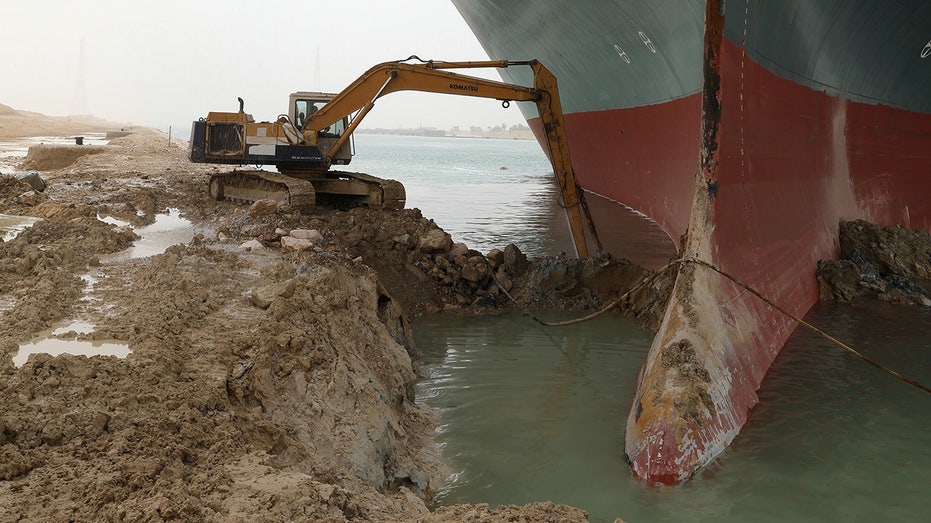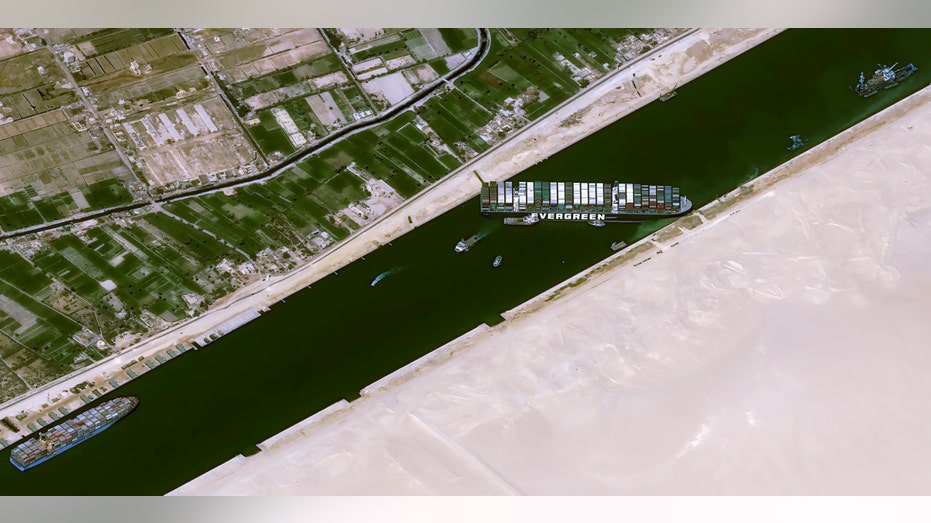Suez Canal blockage: Coffee, other goods at risk of price hikes
Hundreds of ships are blocked by the the MV Ever Given
Congestion in Eygpt's Suez Canal may cause shipping delays with instant coffee and other products.
The MV Ever Given, a cargo ship the size of a skyscraper registered in Panama, got stuck in the canal on Tuesday. The Suez Canal Authority said Friday that efforts to refloat the ship lodged between the waterway's eastern and western walls were underway.
Cargo ship delays in the waterway will likely impact product shipments to Europe but may expand to U.S. shipments, including toilet paper and the robusta coffee used in products like Nestle's Nescafe, as Bloomberg first reported.

Continuing the Floatation Works of the Grounding Vessel in the Suez Canal (Credit: Suez Canal Authority)
"We have been concerned about supply disruptions since the beginning of the pandemic, and the human struggles behind them," Doug Welsh, Coffee & Roastmaster Vice President at Peet's Coffee, told Fox News in a statement. "Like many of the obstacles to date, the Suez blockage is likely to cause severe but temporary delay[s] in a particular part of our coffee supply, namely from East Africa producers like Ethiopia."
He continued: "Fortunately, our suppliers have worked tirelessly and creatively to keep the flow of high-quality coffee coming to our grateful customers, despite these ongoing challenges, and we believe our overall volume of coffee to be secure for the moment."
Coffee importer Trabocca tweeted Friday that as the Ever Given blocks the Suez, the company knows "it will delay coffee too" -- possibly even the "delivery of your coffee.
Nestle, Starbucks and Folger's coffee brands did not immediately respond to Fox News' request for comment.
| Ticker | Security | Last | Change | Change % |
|---|---|---|---|---|
| NSRGY | NESTLÉ SA | 101.81 | +1.24 | +1.23% |
| SBUX | STARBUCKS CORP. | 99.45 | +3.38 | +3.52% |
| SJM | THE J. M. SMUCKER CO. | 109.51 | +0.23 | +0.21% |
| JDEP | NO DATA AVAILABLE | - | - | - |
Supply chain delays resulting from the canal could result in higher prices for consumers, experts say.
SUEZ CANAL BLOCKAGE FORCES OPERATORS TO REROUTE SHIPS
The blockage in the canal, which provides a transportation route for 10% of global trade, could disrupt the flow of nearly $10 billion worth of goods that travel through the Suez every day.
More than 50 vessels travel through the 300-foot-wide, man-made waterway every day, transporting 1.9 million barrels of oil daily and 1.2 billion pounds of cargo annually, according to Lloyd's List.
SUEZ CANAL GOODS DELAYS COULD WORSEN IF SHIP IS NOT FREED SOON
The blockage could cause supply chain issues for companies selling everything from oil to automobiles and bicycles to clothing and consumer electronics, Jennifer Bisceglie, founder of tech company Interos, which maps suppliers and helps customers navigate supply-chain vulnerabilities from operational disruptions, told FOX Business.
"You have goods and parts of goods -- components -- that go into every industry, if you will, that are all stuck in one place," Bisceglie said. "So, from a financial standpoint, the ripple effect could continue."

This satellite image from Cnes2021, Distribution Airbus DS, shows the cargo ship MV Ever Given stuck in the Suez Canal near Suez, Egypt, Thursday, March 25, 2021. Cnes2021, Distribution Airbus DS via AP)
Consumers could see price hikes for oil and gas, travel and even clothing as a direct result of the canal issue impacting certain supply chains just as people start to return to work and take vacations for spring break.
Bisceglie described the obstruction as something known as a physical, or supply chain, "concentration risk" because there is a "heavy concentration of transport risk" in one specific area. which comes after a year of another physical concentration risk -- the COVID-19 pandemic.
GET FOX BUSINESS ON THE GO BY CLICKING HERE
"How many more of these do we need to experience to learn that the ripple effect to the economy -- we can't keep operating the same way," she said.
From a solutions standpoint, companies need to figure out how to anticipate these issues before they happen, which comes from "mapping out the multiple-tier supply chain, identifying where alternatives are needed and putting some agility in place," Bisceglie explained.
CLICK HERE TO READ MORE ON FOX BUSINESS
"Supply chains and what happened with COVID and what's happening in the canal and the breakage you're seeing ... they are operating exactly as they were designed. They were designed very just-in-time and very fragile," she said, adding that it's "not just a logistical supply chain issue," and technology has to be added to the equation to prevent these issues from reoccurring.
The Associated Press contributed to this report.



















